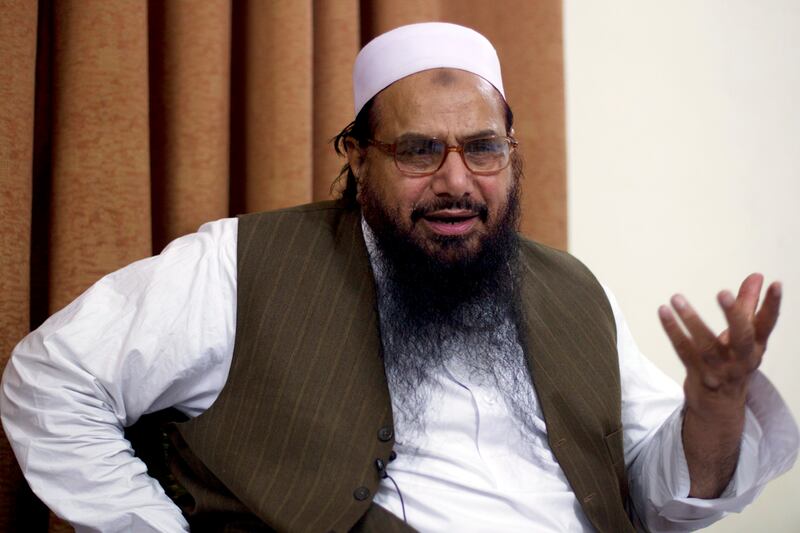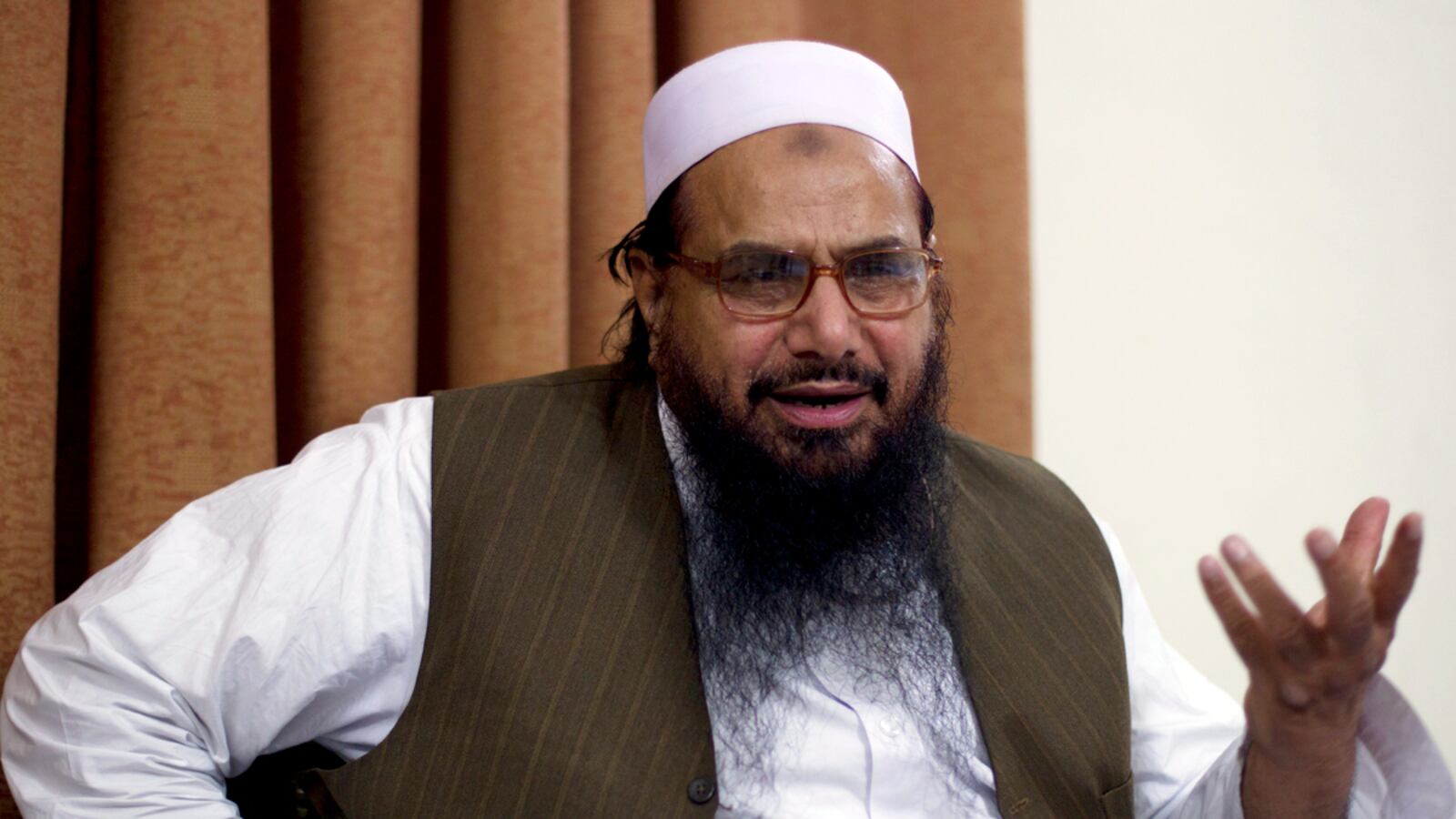Hafiz Saeed is not a hard man to find. To prove this point, Saeed, fiery founder of the jihadist organization Lashkar-e-Taiba, held a packed, rare press conference in Rawalpindi on Wednesday. “I am here. I am visible,” he said, smiling defiantly and thumbing his nose at the U.S., which has recently announced a $10 million reward for information leading to his arrest. “America should just give the reward money to me!”
Saeed did not appreciate the fact that the U.S. announcement was made in India, which has accused Saeed of masterminding the 2008 Mumbai attacks and which included him on its list last year of most-wanted fugitives hiding out in Pakistan. “It is obvious this has been done to please India,” he said. Saeed protested that he had already condemned the Mumbai attacks and was preoccupied now only with efforts to serve “humanity.”
“Our work,” said Saeed of his charity organization, Jamat-ud-Dawah, which was also banned by the U.N. in 2008 but that operates openly in Pakistan, “is based on humanity and our organization works solely for this.” He said if the U.S. were to give him the $10 million, he would spend it on good deeds in Balochistan, the restive Pakistani province wracked by an insurgency the government blames partly on India.
Saeed also said he and his organizations had been given a clean chit by Pakistan’s Supreme Court in 2010. “It’s a shame they don’t respect our courts,” he said of the U.S. and India, countries he views as Pakistan’s sworn enemies. The country’s courts blame improper prosecution for their scandalously meagre conviction rate for suspected terrorists.

U.S. Undersecretary of State Wendy Sherman announced Saeed and Taiba cofounder Hafiz Abdul Rehman Makki’s inclusion on the State Department’s Rewards for Justice listing on April 2 during a four-day visit to India. Actionable information on Makki, who is also Saeed’s brother-in-law, carries an inducement of $2 million. The following day, State Department spokesperson Victoria Nuland said the bounty on the two men “had everything to do with Mumbai.”
The U.S. bounty changes nothing, according to analyst Hasan-Askari Rizvi. “Usually such a bounty is placed on persons who are in hiding, Hafiz Saeed is not,” he said. “This is a propaganda device that won’t yield any result or change the reality on the ground.” Right on cue, Pakistan’s Foreign Office said today that Islamabad will act against Saeed and Makki if evidence is provided against them.
At his presser at Flashman’s Hotel in Rawalpindi, 61-year-old Saeed, clad in white shalwar kameez and brown waistcoat, called the U.S. announcement “the biggest joke in history.” But, given the symbolism of where he chose to make his media appearance, this is no laughing matter. Rawalpindi is the home of the Pakistan Army, which had previously patronized Saeed and his organizations in order to bleed India in Kashmir and which has been accused of complicity in hiding Osama bin Laden or incompetence in rooting him out.
Those old links with the Army may not have been entirely severed. Saeed is now part of the Difa-e-Pakistan (or Defense of Pakistan) Council, which is led by former ISI chief Hamid Gul, includes 36 hard-right political parties, and has the support of rising political star Imran Khan. This group—which has been holding well-attended rallies across Pakistan, advocates breaking all ties with the U.S., Pakistan’s largest aid giver, and India. The council is believed to have the support of the country’s security establishment, or at least elements within it. Council members flanked Saeed at Wednesday’s press conference.
Saeed said he was being targeted and sullied for defending Pakistan’s national honor by speaking up against CIA drone strikes and leading calls for the permanent suspension of NATO supply lines. “They think this will pressure us into changing our stance on the NATO supply line?” he said. “This will never happen!” Last month, Saeed sent letters to members of Parliament urging them to “break from party policy” and reject any moves to reopen the NATO supply route for Afghanistan. The Defense of Pakistan Council held nationwide protests after NATO mistakenly fired at two Pakistani checkpoints in the Mohmand tribal agency Nov. 26 that left 24 soldiers dead. Saeed claims that the renewed American focus on him proves the U.S. is “seeking a solution by any means necessary.” “Stooping to this level proves the U.S. is facing utter defeat in Afghanistan,” he said. “The Foreign Office should call on the U.S. ambassador and lodge a severe protest; this is clear-cut interference in our sovereignty.”
In Pakistan, Saeed is the jihadist version of a rock star, his popularity boosted by American and Indian responses to his fulminous tirades against them. He’s also burnished his credentials through high-profile charity work. Saeed’s Jamat-ud-Dawah was given free rein by the authorities after the 2005 earthquake and the 2010 floods to raise funds and set up camps. And now the U.S. announcement will play well to his constituency. “The bounty has made Hafiz Saeed a global name,” a member of his entourage told The Daily Beast, wishing not to be named. “More and more people will now learn about Saeed’s ideology, and we should find it easy to introduce ourselves in future.”
Talat Masood, a retired Army general and defense analyst, agrees with the assessment. “For now he’s a hero to the masses,” he told The Daily Beast. “He’s trying to prove that he is a patriot and is standing up to the great power of the world, but the U.S. means business.”
Saeed, of course, couldn’t care less. Asked if he feared an Abbottabad-style operation against him, Saeed dared the U.S. to take him on. “If the U.S. wants, I am ready to share my schedule with them,” he said. “I will now be leaving for Narowal and will be in Lahore tomorrow.”
On stage alongside Saeed at the press conference, Maulana Sami-ul-Haq, who tutored Taliban chief Mullah Omar, warned that any American attack on Saeed would elicit a response “not merely limited to condemnation.” Haq offered that Saeed was willing to be tried for any perceived crimes in any Pakistani court. “Americans can send their observers if they wish,” he added. Saeed is feared by the courts which have let him off repeatedly for lack of evidence. Haq denied claims that the ISI was supporting the newly cobbled coalition of old jihadists and announced a nationwide protest against the U.S. for Friday.
In 2001, Saeed was arrested after India accused him of involvement in the attack on the Indian Parliament that resulted in 12 dead. He was released after three months. Similarly, he was placed under house arrest in 2006 shortly after the Mumbai train bombings that year and let off after two months. Two years later, Saeed was placed under house arrest again after the U.N. banned his Jamat-ud-Dawah organization. He was released seven months later after the Lahore High Court deemed his detention “unconstitutional.”
In the weeks following the 2008 Mumbai attacks, there were fears in Pakistan that India could retaliate with airstrikes on Saeed’s headquarters in Muridke near Lahore or that his compound could be targeted by U.S. drones. So real were such fears that the Pakistan military signalled to India warning against any “misadventure” and the Air Force scrambled jets in an exercise to calm an easily excitable public.







